
Billion Dollar Babies is the sixth studio album by American rock band Alice Cooper, released in March 1973 by Warner Bros. Records. The album became the best selling Alice Cooper record at the time of its release, hit number one on the album charts in both the United States and the United Kingdom, and went on to be certified platinum by the Recording Industry Association of America. The album has been retrospectively praised by such critics as Robert Christgau, Greg Prato of AllMusic, and Jason Thompson of PopMatters, but The Rolling Stone Album Guide (2004) gave the album only two and a half stars.
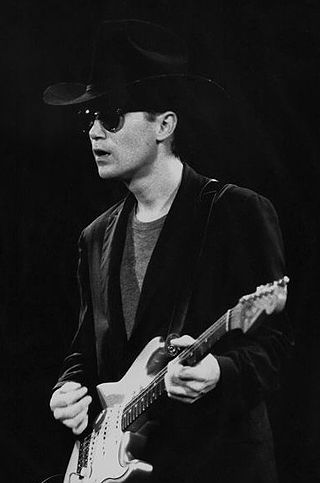
Marshall Howard Crenshaw is an American musician, singer, songwriter, and guitarist best known for hit songs such as "Someday, Someway," a US top 40 hit in 1982, "Cynical Girl," and "Whenever You're on My Mind." He is also the co-author of one of the biggest radio hits of the 1990s, the Gin Blossoms, "Til I Hear It from You." His music has roots in classic soul music and Buddy Holly, to whom Crenshaw was often compared in the early days of his career, and whom he portrayed in the 1987 film La Bamba.

Chronic Town is the debut EP by American alternative rock band R.E.M., released on August 24, 1982, on I.R.S. Records. Containing five tracks, the EP was recorded at the Drive-In Studio in Winston-Salem, North Carolina, in October 1981, eighteen months after the formation of the band. Its co-producer was Mitch Easter, who produced the band's "Radio Free Europe" single earlier in 1981.
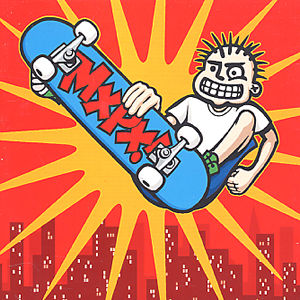
Let It Happen is a B-sides and rarities album by punk rock band MxPx.

Beauty and Sadness is the second EP by The Smithereens, released in June 1983 on Little Ricky Records.
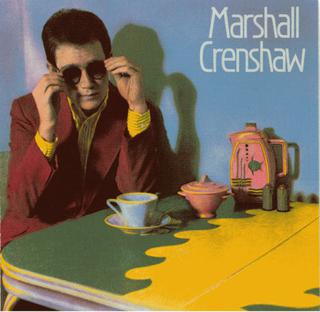
Marshall Crenshaw is the debut studio album by American musician Marshall Crenshaw. It was released on April 28, 1982, by Warner Bros. Records. Crenshaw, a performer in the musical Beatlemania, had begun to write songs for the album while staying in New York. The album was recorded with his backing band and producer Richard Gottehrer, engineer Thom Panunzio, and second engineer Jim Ball.

"You're My Favorite Waste of Time" is a song written and first released by American singer Marshall Crenshaw. His 1979 home demo of the song was released as the B-side of his 1982 hit "Someday, Someway" and is available on his compilations The 9 Volt Years and This Is Easy: The Best of Marshall Crenshaw.

Field Day is the second album by American rock musician Marshall Crenshaw. Recorded quickly after the moderate success of his self-titled debut album, Field Day featured a change in style and production after Crenshaw switched producers from Richard Gottehrer to Steve Lillywhite. The recording of the album was remembered positively by Crenshaw as was the album's sound.

Terrace Jamahl Martin is an American musician, rapper, singer, and record producer. He is perhaps best known for producing records for several prominent artists in the music industry, including Kendrick Lamar, Snoop Dogg, the Game, Busta Rhymes, Stevie Wonder, Charlie Wilson, Raphael Saadiq and YG, among others. Martin is a multi-instrumentalist whose music production embodies funk, jazz, classical and soul. Martin released his sixth studio album, Velvet Portraits, on his label, Sounds of Crenshaw Records, through Ropeadope Records.

Savoir Adore is a pop-rock group duo from Brooklyn, New York City, United States initially consisting of Paul Hammer and Deidre Muro. In 2014, Deidre Muro left the band while Hammer worked with a guest vocalist. Hammer began collaborating with Lauren Zettler shortly after, and she became a permanent member. As of June 2020 the band has released five albums, several EPs, numerous singles and a number of remixes albums. They also have done an international tour.

"Some Hearts" is a song written by Diane Warren. The track was originally written for Belinda Carlisle, who recorded it as a demo for her 1987 Heaven on Earth album, but it was not included on the album. It was released as a single by Marshall Crenshaw from his 1989 album, Good Evening, but it failed to chart. Singers that have covered the song include Kelly Levesque, featured in the 2001 film America's Sweethearts, Maria Arredondo for her 2004 album Not Going Under, and Carrie Underwood for her debut album of the same name.

Mary Jean & 9 Others is the fourth album by singer-songwriter Marshall Crenshaw. The album was produced by Don Dixon and features a return to the sounds of Crenshaw's earlier work after the country rock excursion of his previous album, Downtown.

B-Sides and Rarities is a compilation album by American dream pop band Beach House, released on June 30, 2017 through Sub Pop in North America, Bella Union in Europe, and Mistletone Records in Australia. The compilation contains B-sides and rare, unreleased cuts along with two new songs, "Chariot" and "Baseball Diamond". It also includes the band's cover of Queen's "Play the Game".

"Someday, Someway" is a 1982 song by American rock musician Marshall Crenshaw. The song was released on his 1982 debut album, Marshall Crenshaw.

"Whenever You're on My Mind" is a 1983 song by American rock musician Marshall Crenshaw. The song was released on his 1983 album Field Day. The song, notable for its booming production, originally was written during the making of Crenshaw's debut album but was saved for his second album release. Crenshaw felt the song was his best to date, and the song was released as Field Day's first single.
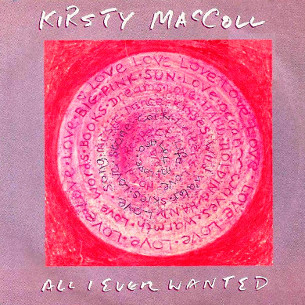
"All I Ever Wanted" is a song by British singer-songwriter Kirsty MacColl, which was released in 1991 as the third and final single from her third studio album Electric Landlady. It was written by MacColl and Marshall Crenshaw, and produced by Steve Lillywhite.
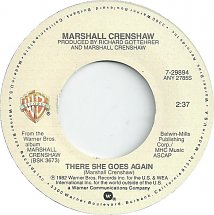
"There She Goes Again" is a 1982 song by American rock musician Marshall Crenshaw. The song was released on his 1982 debut album, Marshall Crenshaw. Lyrically, the song was written about seeing a girl from one's window as she passes by in a car, an image that Crenshaw later said was inspired by his youth.

"Cynical Girl" is a 1982 song by American rock musician Marshall Crenshaw. The song was released on his 1982 debut album, Marshall Crenshaw. Written as a satire on the "mass culture" that Crenshaw disliked, the song was not based on a specific girl.
"Mary Anne" is a 1982 song by American rock musician Marshall Crenshaw. The song was released on his 1982 debut album, Marshall Crenshaw. Written from the perspective of trying to console someone, the song's title was not based on a specific girl. The song's hook was described by Crenshaw as going for a "hypnotic" effect and the song features layered 12-string guitar parts.

"Blues Is King" is a 1985 song by American rock musician Marshall Crenshaw. The song was released on his 1985 album Downtown. Originally written as an instrumental titled "Bruce Is King," the song features lyrics inspired by the B.B. King album Blues Is King.



















